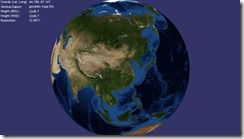osgEarth基础入门
osgEarth基础入门
2015年3月21日
16:19
osgEarth是基于三维引擎osg开发的三维数字地球引擎库,在osg基础上实现了瓦片调度插件,可选的四叉树调度插件,更多的地理数据加载插件(包括GDAL,ogr,WMS,TMS,VPB,filesystem等),再结合一套地理投影转换插件,这样就能够实现高效处理加载调度地理数据在三维地球上的显示,实现三维虚拟地球。
想要实现一个简单的基于osgEarth的三维地球,有两种方式,这两种方式是互通的。一种基于XML标签的earth文件加载,另外一种是采用C++代码,本质是一样的,osgEarth内部支持直接解析XML标签文件,转换为代码实现,具体参考tests文件夹例子,代码则参考application下面例子。但是大多数情况下,你需要更灵活掌控性更强的代码来实现功能,因为只有一个加载了基础数据的三维地球是只能看,不能解决实际问题的,需要界面通常采用QT,更多的三维渲染和仿真业务则由osg来完成。因此学好osg是做这一切的基础。
osgEarth的特点:支持加载常见的栅格数据(影像和DEM),但是大数据必须建立金字塔,设置为地理投影,想要高效率最好处理为瓦片,这样也便于部署在服务端。矢量数据,最好尽可能的简化,因为大的矢量会十分影响渲染速度,当然也可以对矢量栅格化处理加快速度,对于模型的话,大数据量一定要做LOD或者pageLod。
osgEarth程序的常规流程:
创建osgViewer---->创建MapNode---->设置Earth操作器---->设置场景参数----->run
MapNode是继承自osg的Node,是osgEarth中地球节点,你所添加的影像,DEM,模型都包含在MapNode中,因为它们都加入到Map中,Map则类似二维中的Map可以添加各种图层。剩余的不管是模型节点Node,或者是标注Node,还是其他的都是可以直接添加到MapNode中或者另外的Group中。
Earth操作器则和其他osg操作器一样,只不过专门为三维地球浏览定制,具体参数可以设置。
场景参数则主要有自动地形裁剪,最小裁剪像素等其他优化场景的参数。
下面就简单阐述一个小例子说明:
代码功能主要实现了查询实时高程,并显示XYZ坐标的功能。
使用命令app.exe test.earth即可得到下面的效果。
//引入osg和osgEarth的头文件和命名空间 #include <osgGA/StateSetManipulator> #include <osgGA/GUIEventHandler> #include <osgViewer/Viewer> #include <osgViewer/ViewerEventHandlers> #include <osgUtil/LineSegmentIntersector> #include <osgEarth/MapNode> #include <osgEarth/TerrainEngineNode> #include <osgEarth/ElevationQuery> #include <osgEarth/StringUtils> #include <osgEarth/Terrain> #include <osgEarthUtil/EarthManipulator> #include <osgEarthUtil/Controls> #include <osgEarthUtil/LatLongFormatter> #include <iomanip> using namespace osgEarth; using namespace osgEarth::Util; using namespace osgEarth::Util::Controls; static MapNode* s_mapNode = 0L; static LabelControl* s_posLabel = 0L; static LabelControl* s_vdaLabel = 0L; static LabelControl* s_mslLabel = 0L; static LabelControl* s_haeLabel = 0L; static LabelControl* s_mapLabel = 0L; static LabelControl* s_resLabel = 0L; // An event handler that will print out the elevation at the clicked point //查询高程的一个事件回调,在场景有事件更新触发时调用,详细参考osg或者osgGA::GUIEventHandler struct QueryElevationHandler : public osgGA::GUIEventHandler { //构造函数 QueryElevationHandler() : _mouseDown( false ), _terrain ( s_mapNode->getTerrain() ), _query ( s_mapNode->getMap() ) { _map = s_mapNode->getMap(); //初始化最大查询LOD级别 _query.setMaxTilesToCache(10); _path.push_back( s_mapNode->getTerrainEngine() ); } //更新回调,具体的内容可以参考父类,传进来的参数是屏幕坐标xy,和osgViewer void update( float x, float y, osgViewer::View* view ) { bool yes = false; // look under the mouse: //采用线去对地球做碰撞检测,根据鼠标点击点去检测,得到交点,就是当前点的xyz osg::Vec3d world; osgUtil::LineSegmentIntersector::Intersections hits; //判断求交结果是否为空 if ( view->computeIntersections(x, y, hits) ) { //得到世界坐标系下面的坐标,就是osg的xyz坐标 world = hits.begin()->getWorldIntersectPoint(); // convert to map coords: //将其转换为地球的地理坐标,转换方法都照抄即可 GeoPoint mapPoint; mapPoint.fromWorld( _terrain->getSRS(), world ); // do an elevation query: double query_resolution = 0; // 1/10th of a degree double out_hamsl = 0.0; double out_resolution = 0.0; //根据输入参数查询当前点位置的高程,需要设置分辨率,就是查询精度 bool ok = _query.getElevation( mapPoint, out_hamsl, query_resolution, &out_resolution ); //如果查询成功 if ( ok ) { // convert to geodetic to get the HAE: mapPoint.z() = out_hamsl; GeoPoint mapPointGeodetic( s_mapNode->getMapSRS()->getGeodeticSRS(), mapPoint ); //经纬度坐标的格式化工具,也可以自己用字符串去拼接xyz数字 static LatLongFormatter s_f; //更新显示的xyz值,label是传入的控件 s_posLabel->setText( Stringify() << std::fixed << std::setprecision(2) << s_f.format(mapPointGeodetic.y()) << ", " << s_f.format(mapPointGeodetic.x()) ); //还可以输出分辨率,椭球体信息等 s_mslLabel->setText( Stringify() << out_hamsl ); s_haeLabel->setText( Stringify() << mapPointGeodetic.z() ); s_resLabel->setText( Stringify() << out_resolution ); yes = true; } // finally, get a normal ISECT HAE point. GeoPoint isectPoint; isectPoint.fromWorld( _terrain->getSRS()->getGeodeticSRS(), world ); s_mapLabel->setText( Stringify() << isectPoint.alt() ); } //如果查询不到高程的话 if (!yes) { s_posLabel->setText( "-" ); s_mslLabel->setText( "-" ); s_haeLabel->setText( "-" ); s_resLabel->setText( "-" ); } } //参数一个是事件的动作,另外一个是对应的操作 bool handle( const osgGA::GUIEventAdapter& ea, osgGA::GUIActionAdapter& aa ) { //判断如果是移动鼠标事件才进行更新当前的坐标显示 if (ea.getEventType() == osgGA::GUIEventAdapter::MOVE && aa.asView()->getFrameStamp()->getFrameNumber() % 10 == 0) { osgViewer::View* view = static_cast<osgViewer::View*>(aa.asView()); update( ea.getX(), ea.getY(), view ); } return false; } //Map对象 const Map* _map; //地形对象 const Terrain* _terrain; bool _mouseDown; //查询高程使用的对象 ElevationQuery _query; osg::NodePath _path; }; //main函数, int main(int argc, char** argv) { //这儿两个参数,第一个是命令参数的个数为,后面是字符串数组输入earth文件的路径osg::ArgumentParser arguments(&argc,argv); //osg的场景 osgViewer::Viewer viewer(arguments); //构造MapNode,arguments里面有earth文件的路径,命令行输入 s_mapNode = MapNode::load(arguments); //如果路径不正确或者earth文件错误,没有构造好MapNode if ( !s_mapNode ) { OE_WARN << "Unable to load earth file." << std::endl; return -1; } //建立一个组节点 osg::Group* root = new osg::Group(); //将组节点设置为场景节点 viewer.setSceneData( root ); // install the programmable manipulator. //设置earth操作器 viewer.setCameraManipulator( new osgEarth::Util::EarthManipulator() ); // The MapNode will render the Map object in the scene graph. //将MapNode添加到组节点中去 root->addChild( s_mapNode ); //下面是设置一个控件,grid的意思是用格网去布局里面的小控件 // Make the readout: Grid* grid = new Grid(); //设置几个Label文字控件显示在场景中的第行 grid->setControl(0,0,new LabelControl("Coords (Lat, Long):")); grid->setControl(0,1,new LabelControl("Vertical Datum:")); grid->setControl(0,2,new LabelControl("Height (MSL):")); grid->setControl(0,3,new LabelControl("Height (HAE):")); grid->setControl(0,4,new LabelControl("Isect (HAE):")); grid->setControl(0,5,new LabelControl("Resolution:")); //设置几个Label文字控件显示在场景中的第行 s_posLabel = grid->setControl(1,0,new LabelControl("")); s_vdaLabel = grid->setControl(1,1,new LabelControl("")); s_mslLabel = grid->setControl(1,2,new LabelControl("")); s_haeLabel = grid->setControl(1,3,new LabelControl("")); s_mapLabel = grid->setControl(1,4,new LabelControl("")); s_resLabel = grid->setControl(1,5,new LabelControl("")); //得到空间参考,椭球面信息,并显示对应上面的label const SpatialReference* mapSRS = s_mapNode->getMapSRS(); s_vdaLabel->setText( mapSRS->getVerticalDatum() ? mapSRS->getVerticalDatum()->getName() : Stringify() << "geodetic (" << mapSRS->getEllipsoid()->getName() << ")" ); //控件绘制容器 ControlCanvas* canvas = new ControlCanvas(); //将要显示的控件加入到root组节点中去 root->addChild(canvas); canvas->addControl( grid ); //添加刚刚自定义的查询高程的事件回调 // An event handler that will respond to mouse clicks: viewer.addEventHandler( new QueryElevationHandler() ); //添加状态显示,窗口改变等事件回调 // add some stock OSG handlers: viewer.addEventHandler(new osgViewer::StatsHandler()); viewer.addEventHandler(new osgViewer::WindowSizeHandler()); viewer.addEventHandler(new osgGA::StateSetManipulator(viewer.getCamera()->getOrCreateStateSet())); //run return viewer.run(); }
